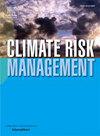A comprehensive review of urban agriculture in a changing climate: Technological innovations and policy frameworks
IF 5
2区 环境科学与生态学
Q1 ENVIRONMENTAL SCIENCES
引用次数: 0
Abstract
Urban and peri-urban agriculture, also referred to as UPA, focuses on tackling the dual challenges of improving food security while addressing poverty reduction, the negative impacts of rapid urbanization, and climate change resilience at the community level. While meeting these objectives, the productivity and sustainability of UPA is threatened by ever-changing and unpredictable environmental conditions. This holistic review includes synthesizing research on UPA, specifically within the context of its advantages, challenges, and climate change mitigation and adaptation efforts. UPA sustainability and resilience in the face of climate change is enhanced by technological innovations such as precision agriculture, vertical farming, AI systems, and hydroponics. The review investigates policies supporting UPA relevant to zoning, incentive design, water provision, and waste management. Results demonstrate UPA’s ability to advance social interactions, improve urban microclimates, mitigate the urban heat island phenomenon, and provide essential ecosystem services though limited by scarce land resources and soil contamination, along with water management challenges and regulatory frameworks. Realization of UPA’s potential in fostering sustainable and resilient urban food systems emphasizes the importance of emerging technologies and integrated policies.
气候变化中的都市农业:技术创新和政策框架
城市和城郊农业(也称为UPA)侧重于应对改善粮食安全的双重挑战,同时应对减贫、快速城市化的负面影响以及社区层面的气候变化适应能力。在满足这些目标的同时,UPA的生产力和可持续性受到不断变化和不可预测的环境条件的威胁。这一全面审查包括对UPA的综合研究,特别是在其优势、挑战以及减缓和适应气候变化努力的背景下。精准农业、垂直农业、人工智能系统和水培等技术创新增强了UPA在气候变化面前的可持续性和复原力。该审查调查了与分区、激励设计、供水和废物管理相关的支持UPA的政策。结果表明,UPA能够促进社会互动,改善城市小气候,缓解城市热岛现象,并提供基本的生态系统服务,尽管受到稀缺土地资源和土壤污染的限制,以及水管理挑战和监管框架。实现UPA在促进可持续和有韧性的城市粮食系统方面的潜力,强调了新兴技术和综合政策的重要性。
本文章由计算机程序翻译,如有差异,请以英文原文为准。
求助全文
约1分钟内获得全文
求助全文
来源期刊

Climate Risk Management
Earth and Planetary Sciences-Atmospheric Science
CiteScore
8.20
自引率
4.50%
发文量
76
审稿时长
30 weeks
期刊介绍:
Climate Risk Management publishes original scientific contributions, state-of-the-art reviews and reports of practical experience on the use of knowledge and information regarding the consequences of climate variability and climate change in decision and policy making on climate change responses from the near- to long-term.
The concept of climate risk management refers to activities and methods that are used by individuals, organizations, and institutions to facilitate climate-resilient decision-making. Its objective is to promote sustainable development by maximizing the beneficial impacts of climate change responses and minimizing negative impacts across the full spectrum of geographies and sectors that are potentially affected by the changing climate.
 求助内容:
求助内容: 应助结果提醒方式:
应助结果提醒方式:


